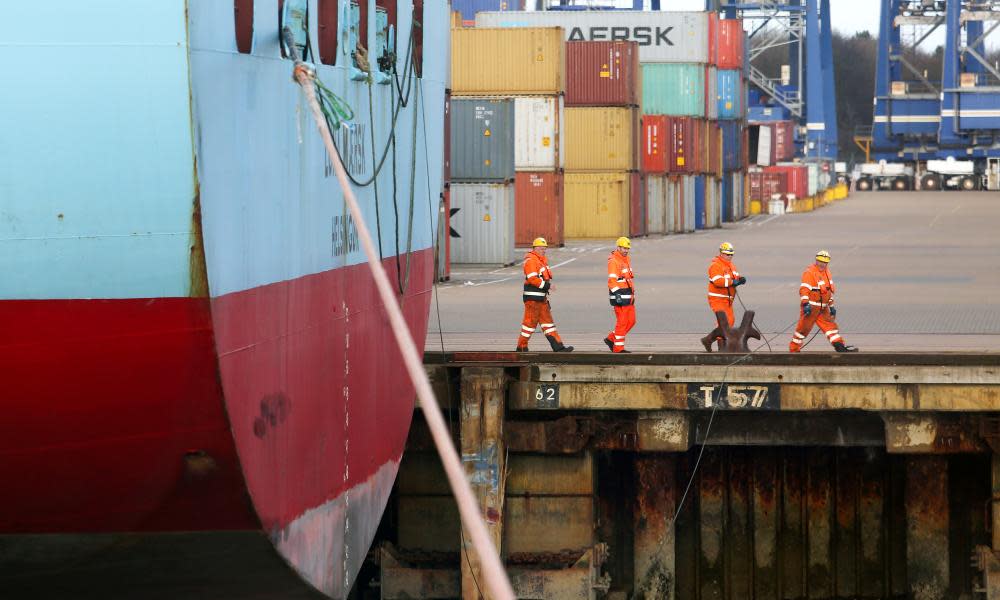No-deal Brexit will cost everyone in UK £1,585, says US thinktank

A no-deal Brexit would take 4.7% out of UK economy over 10 years, costing the UK £105bn and each member of the population £1,585, research by a US thinktank has found.
The study by the authoritative Rand Corporation, one of the largest to look at the effect of various forms of Brexit on the European, British and American economies, finds that the UK will be better off under a “no-Brexit” outcome. This scenario includes the softest Brexit option of remaining in the single market as Norway does.
The report, After Brexit, adds that it may take as long as 12 years from Brexit, or until 2031, for any dynamic effects from regulatory divergence from the EU to have any beneficial impact.
The loss to the EU of a no-deal Brexit are calculated to be relatively minor, set at 0.7% of GDP over 10 years.
What are Brexit options now? The four scenarios
If the UK has a change of heart, it could sign up to all the EU’s rules and regulations, staying in the EU’s single market and customs union. Freedom of movement would continue and the UK would keep paying into the Brussels pot. We would continue to have unfettered access to EU trade, but the pledge to “take back control” of laws, borders and money would not have been fulfilled. This is an unlikely outcome and one that may be possible only by reversing the Brexit decision, after a second referendum or election.
Britain could follow Norway, which is in the single market, is subject to freedom of movement rules and pays a fee to Brussels – but is outside the customs union. That combination would tie Britain to EU regulations but allow it to sign trade deals of its own. A “Norway-minus” deal is more likely. That would see the UK leave the single market and customs union and end free movement of people. But Britain would align its rules and regulations with Brussels, hoping this would allow a greater degree of market access. The UK would still be subject to EU rules.
A comprehensive trade deal like the one handed to Canada would help British traders, as it would lower or eliminate tariffs. But there would be little on offer for the UK services industry. It is a bad outcome for financial services. Such a deal would leave Britain free to diverge from EU rules and regulations but that in turn would lead to border checks and the rise of other “non-tariff barriers” to trade. It would leave Britain free to forge new trade deals with other nations. Many in Brussels see this as a likely outcome, based on Theresa May’s direction so far.
Britain leaves with no trade deal, meaning that all trade is governed by World Trade Organisation rules. Tariffs would be high, queues at the border long and the Irish border issue severe. In the short term, British aircraft might be unable to fly to some European destinations. The UK would quickly need to establish bilateral agreements to deal with the consquences, but the country would be free to take whatever future direction it wishes. It may need to deregulate to attract international business – a very different future and a lot of disruption.
The Rand Europe study says the most advantageous Brexit would be a tripartite free-trade deal between the US, the UK and the EU, but admits that this outcome is politically highly unlikely.
The research takes into account the many previous studies trying to model the impact of various types of Brexit, but also covers other scenarios and the impact on the US economy. It says the benefit to the US from a trade deal with the UK would be trivial, and warns if the UK opted for the no-deal exit, the pressure on UK public finances would be large enough to threaten existing British defence spending commitments, so potentially undermining Nato.
It also warns that an EU without the UK “may be more willing to create barriers for non-EU companies, to the detriment of US companies and the American economy”.
The largely US-based Rand Group is not seen to be aligned with any political ideology or group.
Overall, the study finds the UK falling back on World Trade Organisation terms would lead to an estimated 20% fall in overall trade between the UK and the EU while the EU-UK free trade agreement, the closest approximation to the model recently proposed by the Brexit secretary David Davis, would lead to a fall of about 6%.
In absolute terms, leaving the EU to fall back on WTO rules would reduce foreign direct investment (FDI) flow from the EU to the UK by around £5.85bn. If the UK manages to sign a comprehensive free trade agreement with the EU, Rand estimates the UK would suffer a loss in FDI from the EU27 of only about £2.55bn, representing a 9% fall compared with what it would have been if the UK had remained in the EU.
Moreover, the trade benefits of UK free trade agreement with the US are trivial – potentially only 0.2 percentage points of US GDP, or $127 per capita, over 10 years – relative to a complete exit of the UK from the EU ( and not much more than that relative to current arrangements).
The rising trade costs set out in all the Brexit scenarios stems from immediate changes in tariffs on goods, immediate changes in non-tariff barriers on goods and services, and increasing non-tariff barriers over time due to exclusion of the UK from further EU market integration.
• Follow Guardian Business on Twitter at @BusinessDesk, or sign up to the daily Business Today email here.

 Yahoo News
Yahoo News 
